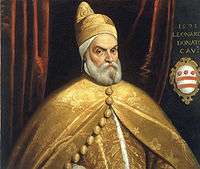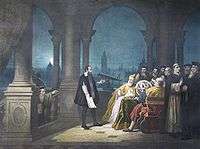Leonardo Donato

Leonardo Donà, or Donato (Venice, February 12, 1536 – Venice, July 16, 1612) was the 90th Doge of Venice, reigning from January 10, 1606 until his death. His reign is chiefly remembered for Venice's dispute with the papacy, which resulted in Pope Paul V placing a papal interdict on Venice 1606–1607.
Background, 1536–1606
The son of Giovanni Battista Donato and Giovanna Corner, Donato was born into a merchant family. Through his shrewd business sense, he was able to turn his family's average amount of wealth into a fortune.
His wealth established, Donato began a public career in Venice, serving in turn as the Venetian ambassador to Constantinople, podestà of Venice, and as governor and procurator of San Marco.
Donato later served as the Venetian ambassador to the Vatican and lived at Rome for many years. His opposition to the ambitions of the papacy led him to conflict with Cardinal Borghese, the future Pope Paul V. Donato's staunchly anti-papal stance led to rumours that he was secretly a Protestant, although historians have not found any evidence of this.
Reign as Doge, 1606–1612
Donato became one of the candidates for Doge upon the death of Marino Grimani on December 25, 1605. Donato faced two opponents in this election (including Marcantonio Memmo, who would eventually succeed him as Doge), but ultimately received both of their support, resulting in his election as Doge on January 10, 1606.
Donato inherited a conflict with the papacy from Grimani: Between 1601 and 1604, Venice, under Grimani's leadership, had passed a number of laws limiting the power of the papacy within the Republic of Venice and withdrawing a number of clerical privileges. This came to a head in late 1605 when Venice charged two priests as common criminals, thus denying their clerical immunity from facing charges in secular courts. On December 10, 1605, two weeks before Grimani's death, Pope Paul V sent a formal protest to Venice.
Shortly after his election as Doge, Donato, at the urging of Paolo Sarpi, rejected Paul V's protest. As a result, in April 1606, Paul V issued a papal interdict on Venice, thus excommunicating the entire Venetian population. At Sarpi's urging, Donato ordered all Roman Catholic clergy to ignore the Pope's interdict and continue to perform the mass, on pain of immediate expulsion from the Venetian Republic. The Venetian clergy all continued to perform mass, except for the Jesuits, who left the Republic (or were expelled depending on one's perspective) rather than violate the papal interdict. The Jesuits would not return to Venice until 1655. Donato and Sarpi were also personally excommunicated by Paul V.

The Kingdom of France acted as a mediator in the dispute between Venice and the papacy. On April 21, 1607, a deal was reached under which the two priests that Venice had charged as common criminals would be handed over to French custody, and, in exchange, the pope would remove the interdict against Venice.
The remainder of Donato's reign as Doge is largely without note. Donato was not at all popular with the Venetian crowd, so, after his first year as Doge, Donato significantly restricted his public appearances as Doge. Many rumours circulated about the reclusive Donato during these years, but none were ever substantiated. He died on July 16, 1612.
References
This article is based on this article from Italian Wikipedia.
| Political offices | ||
|---|---|---|
| Preceded by Marino Grimani |
Doge of Venice 1606–1612 |
Succeeded by Marcantonio Memmo |